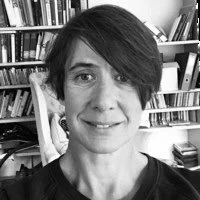I think the reality that the white male perspective is the default is damaging in all areas of culture. This normalised viewpoint, I think, is reflective of male power and unless we can equalise that first, I don’t think change can happen.
Sophia Bartleet
English teacher at Sevenoaks School.
Q & A
Basic Questions:
1. What’s your name?
My name is Sophia Bartleet.
2. Where are you from and where are you currently?
I was born in Paris but I currently live near Hastings in the UK.
3. What do you do?
I'm an English teacher.
Specific Questions:
1. Are other forms of art/ expression of interest to you? If so, which ones and why?
I'm interested in visual arts. I'm interested in photography. And I'm interested in fine art. I've done a lot of drawing and painting in my life.
2. Who is your favourite dead female writer and modern female writer? Why?
My favourite dead female writer is probably Martha Gellhorn, who was an astonishing war reporter — a very brave and good war reporter in the 1930s. Then, choosing a favourite contemporary female writer is quite a tough call. I'd say either Alice Oswald, who is a great eco poet and professor at Oxford, or Andrea Levy, who wrote ‘Small Island’ — she is someone who I think is a really wonderful artist.
3. What challenges have you faced so far in your career?
Well, writing is challenging. It's difficult. It's very difficult. And I've been a mother, so I've had to look after my children and also look after my parents. You know, it's not an easy thing to do — writing. So, I think writing is a challenge. I don’t necessarily get writer’s block, but I don't write as well as I want to.
5. Are there specific obstacles you think female writers face?
Yes, I don't think they're taken as seriously. I think they're asked by their husbands or I think they have to do a tremendous amount of childcare. Besides, women's fiction still has lesser respect, culturally, than men's fiction.
4. What was your dream as a child and what is your dream now? Has it changed?
Okay, so I'm an English teacher, but I'm also a writer. And I wanted to be a writer as a child, but I didn't want to be an English teacher. Now, I do both.
5. Who is your biggest role model?
I don't think I have one right now. No, actually, that's not true. Seamus Heaney! He's probably my biggest role model because he's a great writer. Plus, he's a nice man — not troubled — and has an amazing sensitivity to language.
6. Where do you see yourself in 10 years?
10 years … I see myself probably here at Sevenoaks teaching and continuing my studies. I'm going back to university next year! And, of course, writing.
6. What do you think about the English curriculum in education that is dominated by dead old white male writers?
Okay, so I think it's complex. You want to study the very best writers and the very best writers in the past were predominantly male: women didn't have the opportunities to develop their writing. So, do you want students to study the best? Yes, you do. Do you want them to be aware of women's voices, which will inevitably be different? Yes, you do. So, I always try and make sure that at least a third to a half of my courses are written by women. However, I also want to look at people who've had time and focus on education to be able to really address the human condition, with accuracy and precision and sensitivity, and that's not always been women.
7. For a long time, female characters were wholly written from a male perspective because almost every famous writer was a man. Consequently, the concept of femininity and how a woman ought to be were dictated by men, dismissing the opinions and thoughts of real women. This made women see themselves through the lens of a man too — we call this the ‘male gaze’ today. Personally, I find myself often trying to unlearn what books I read growing up told me were cool/ aspirational. Was there a moment or time when you realised the detrimental impact of misleading books?
I think that the detrimental impact of reading doesn't only stretch to being a woman. I think the reality that the white male perspective is the default is damaging in all areas of culture. This normalised viewpoint, I think, is reflective of male power and unless we can equalise that first, I don’t think change can happen.
